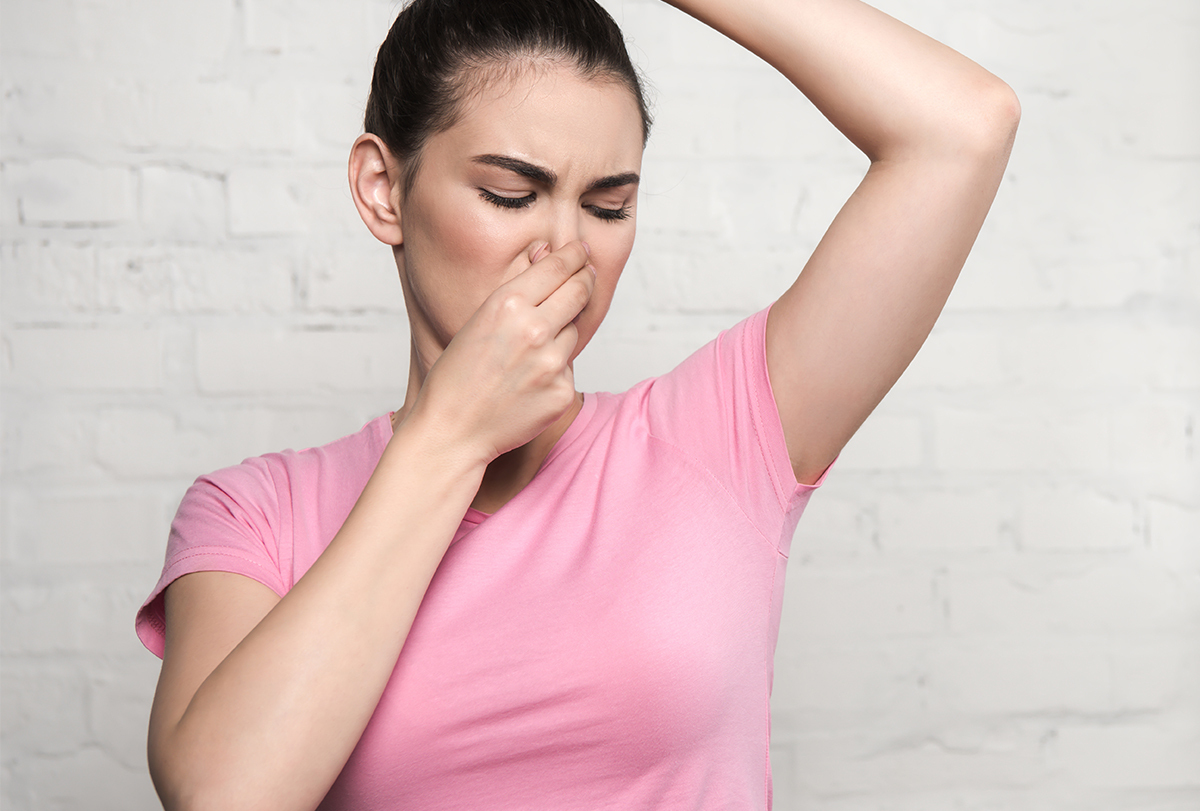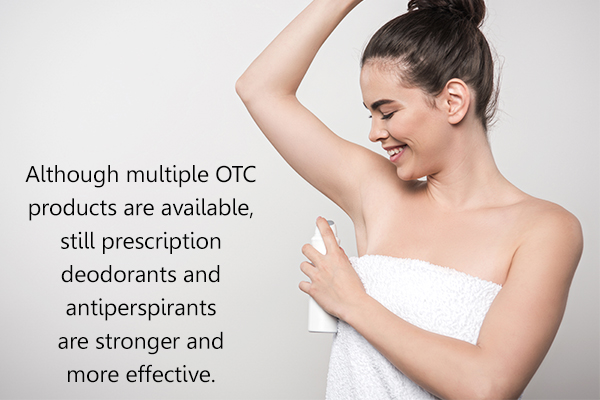In this article:
Body odor (commonly referred to as BO) is the unpleasant smell coming from one’s body during profuse sweating caused by high heat, heavy exercise, or nervousness.

Your skin contains bacteria that breakdown the acids present in your sweat, producing an unpleasant smell, commonly known as body odor.
Causes of Body Odor
Body odor primarily results from the breakdown of amino acids in your sweat by the action of certain bacteria that are normally present on the skin. However, multiple factors can worsen the smell, including:

1. Exercise
Exercise increases sweating, and so more amino acids are metabolized, thus increasing the smell. Additionally, perspiration provides the bacteria with a suitable growth environment on the skin.
2. Hygiene
Improper personal hygiene allows the accumulation of sweat and odor-causing bacteria on the skin.
3. Stress
Anxiety or nervousness stimulates the production of sweat with a higher amount of toxins, which causes more smell than usual.
4. Hot weather
Body odor is common in summers due to the excessive sweating caused by the scorching heat.
5. Diet
Oils, fatty foods, or strong-smelling food such as curry, onions, and garlic can seep through the pores and contribute to body odor.
6. Genetic makeup
Fish odor syndrome, trimethylaminuria (TMAU), is an inheritable condition that causes a fishy malodor. It is suggested that patients of TMAU avoid seafood for treatment. (1)
7. Hormonal changes
Hormones associated with puberty stimulate the sweat glands to produce more sweat.
8. Extreme conditions
Body odor can result from bromhidrosis or hyperhidrosis (excessive sweating), which affects around 2.8% of the US population. (2)
9. Certain medications
Fish oil supplements, antidepressants, and antiseizure, anticholesterol, and migraine medications can cause body odor.
10. Medical conditions
Obesity, kidney or liver problems, diabetes, tumor, gout, menopause, hyperthyroidism, head injury, pituitary gland problems, frostbite, infections, and alcohol consumption can all cause body odor.
Olfactory Reference Syndrome
Olfactory reference syndrome (ORS) is a rare, severe condition wherein the patient has an irrational belief or fear that their body emits an offensive and foul odor.
Symptoms of Body Odor
Body odor is characterized by an unpleasant smell coming from the body, often accompanied by profuse sweating. Sweating and the associated smell is usually normal, but if the body odor is caused by an underlying condition, you may experience other symptoms such as:
- Cold, clammy hands
- Extreme, unexplained sweating
- Sweating in the feet
- Weight loss
- Night sweats
- Fever
- Anxiety
- Loss of appetite
- Rapid heart rate
Medical Treatment for Body Odor

Body odor is a normal phenomenon that can generally be managed by maintaining proper hygiene and care. However, if the problem bothers you or is slightly severe, you may consult a doctor for treatment, which may include:
- Prescription antiperspirants or deodorants: These constitute the standard primary treatment for body odor. While multiple OTC products are available, prescription deodorants and antiperspirants are stronger and more effective.
- Antibiotics: Oral or topical antibiotics such as erythromycin and clindamycin can help reduce the odor-causing bacteria on the skin.
- Botox: This impedes the production of sweat by the eccrine glands. However, the treatment needs to be repeated every few months.
- Surgery: In extreme cases, surgical procedures may be required to remove the sweat glands or block the nerves that signal the activation of sweat glands.
- Iontophoresis: This procedure involves delivering a mild electrical current to body parts with overactive sweat glands.
- Therapy: Relaxation techniques, behavior therapy, and psychotherapy can help control anxiety and thus lower the production of toxin-loaded sweat.
Diagnosing Body Odor
The doctor might ask about your medical history and take a physical exam to determine the underlying cause of your body odor and sweating. The doctor may also order blood and urine tests to rule out medical conditions such as hyperthyroidism, infection, diabetes, and trimethylaminuria.
Does All Sweat Smell?

Whether the sweat causes body odor depends on the amount of sweating and the kind of sweat glands involved.
There are two types of sweat glands – eccrine and apocrine:
1. Eccrine glands
Eccrine glands are present all over the skin. These glands help regulate body temperature by producing sweat in hot conditions.
The sweat produced by eccrine glands generally does not cause a smell since it is primarily composed of water and sodium chloride, along with some chemicals from the interstitial fluid and eccrine glands. (3)
2. Apocrine glands
Apocrine glands are present in hairy body parts such as the genital area and armpits. These glands develop during puberty and release pheromones, which are scented chemicals.
The sweat produced by apocrine glands is viscous and rich in lipids, proteins, ammonia, and sugar. (3) These proteins can be easily utilized by the bacteria, thus causing body odor.
When to See a Doctor
You should consult a medical practitioner if:
- The sweating increases or decreases.
- The body odor or sweating causes distress.
- You experience night sweats.
- There is a change in your body odor.
Final Word
Sweating is absolutely normal, especially in response to hot weather or stressful conditions. However, any abnormal change in your perspiration or body odor may signal a problem. It is best to seek help if you experience excessive sweating (hyperhidrosis) or no sweating (anhidrosis).

- Was this article helpful?
- YES, THANKS!NOT REALLY


